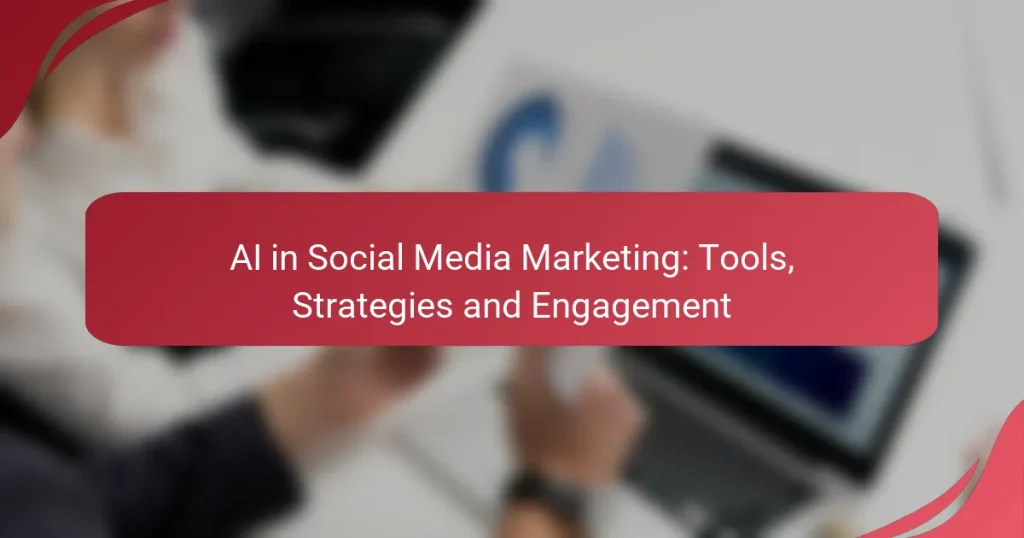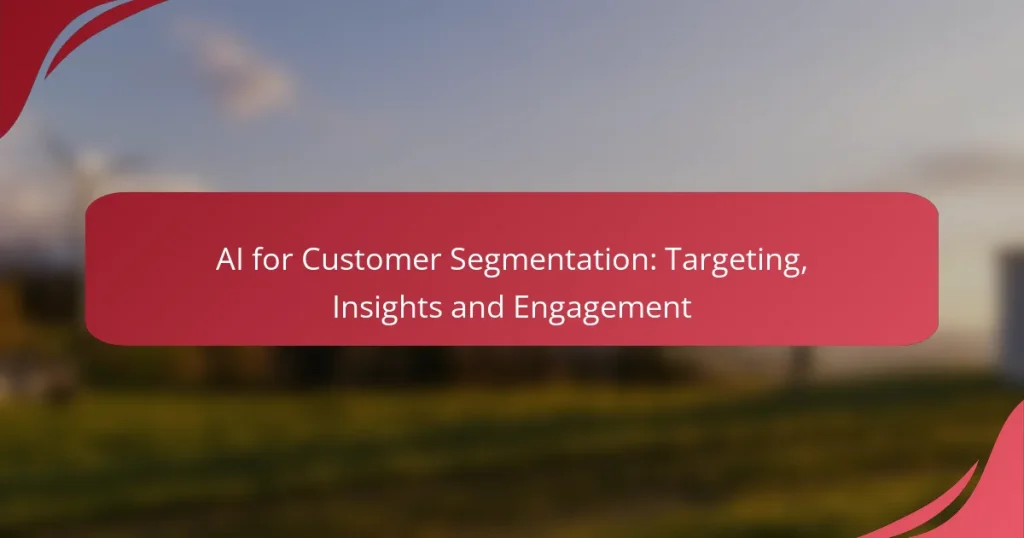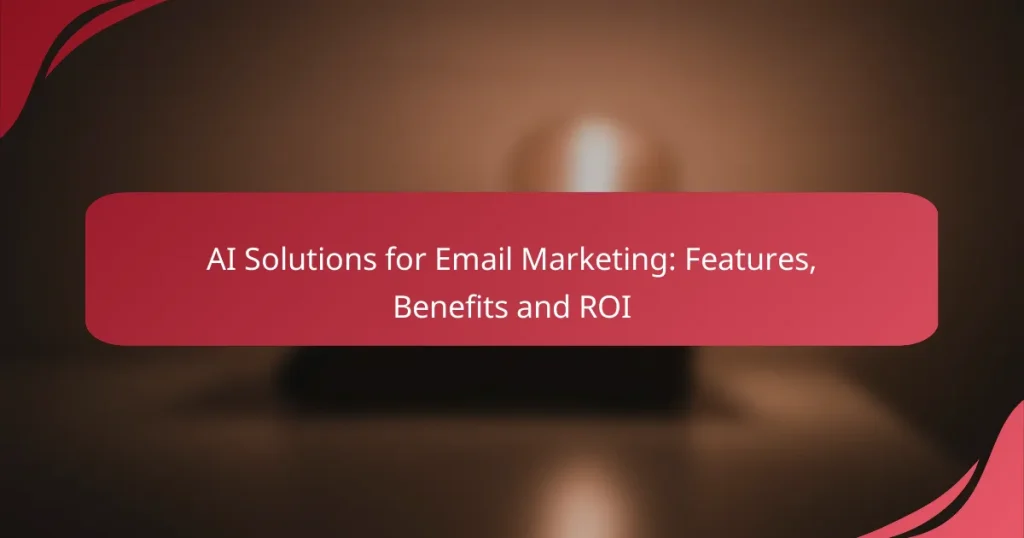AI is revolutionizing marketing strategies by providing businesses with powerful tools to enhance customer engagement and drive sales. By utilizing data analysis and machine learning, companies can tailor their marketing efforts to meet individual consumer preferences, resulting in more effective campaigns. The integration of AI not only improves efficiency but also empowers data-driven decision-making, allowing businesses to optimize their strategies and better serve their customers.
AI for Content Creation: Enhancement, Quality and Efficiency
AI in Social Media Marketing: Tools, Strategies and Engagement
AI-Powered Campaigns: Targeting, Personalization and Automation
AI for Customer Segmentation: Targeting, Insights and Engagement
AI for Ad Spend Optimization: Techniques, Strategies and Savings
AI Solutions for Email Marketing: Features, Benefits and ROI
How can AI enhance marketing strategies in e-commerce?
AI can significantly enhance marketing strategies in e-commerce by providing insights and automating processes that improve customer engagement and sales. By leveraging data analysis and machine learning, businesses can create more effective marketing campaigns tailored to individual consumer preferences.
Personalized customer experiences
AI enables e-commerce businesses to deliver personalized customer experiences by analyzing user behavior and preferences. For instance, recommendation engines can suggest products based on past purchases or browsing history, leading to higher conversion rates.
To implement personalization effectively, consider using customer segmentation techniques and A/B testing to refine your approach. Tools like chatbots can also provide tailored assistance, enhancing user satisfaction.
Predictive analytics for sales forecasting
Predictive analytics uses historical data to forecast future sales trends, allowing e-commerce businesses to make informed decisions. By analyzing patterns in customer behavior and market conditions, companies can anticipate demand and adjust inventory accordingly.
Utilizing predictive analytics can help identify peak shopping periods and optimize pricing strategies. It’s crucial to continuously update your models with new data to maintain accuracy in forecasts.
Automated content generation
AI can automate content generation, streamlining the creation of product descriptions, blog posts, and social media updates. This not only saves time but also ensures consistency in messaging across platforms.
Consider using AI tools that can generate SEO-optimized content to improve visibility. However, always review AI-generated content for quality and relevance to maintain brand voice.
Targeted advertising campaigns
AI enhances targeted advertising campaigns by analyzing consumer data to identify the most effective audience segments. This allows businesses to create ads that resonate with specific groups, improving return on investment.
Utilize AI-driven platforms to optimize ad placements and budgets in real-time. Regularly monitor campaign performance and adjust targeting parameters based on insights to maximize effectiveness.
What are the benefits of using AI in marketing?
Using AI in marketing offers significant advantages, including enhanced efficiency, improved customer engagement, and data-driven decision making. These benefits enable businesses to optimize their marketing strategies and better meet customer needs.
Increased efficiency and productivity
AI can automate repetitive tasks, allowing marketing teams to focus on strategic initiatives. For instance, chatbots can handle customer inquiries 24/7, reducing the workload on human agents and improving response times.
Additionally, AI tools can analyze vast amounts of data quickly, identifying trends and insights that would take humans much longer to uncover. This leads to faster campaign adjustments and more effective resource allocation.
Improved customer engagement
AI enhances customer engagement by personalizing marketing efforts. By analyzing customer behavior and preferences, AI can tailor content and recommendations, making interactions more relevant and appealing.
For example, AI-driven email marketing can segment audiences based on their past interactions, resulting in higher open and conversion rates. This targeted approach fosters stronger relationships with customers.
Data-driven decision making
AI empowers marketers to make informed decisions based on data analysis rather than intuition. By leveraging predictive analytics, businesses can forecast trends and customer behaviors, allowing for proactive strategy adjustments.
Moreover, AI can provide insights into campaign performance in real-time, enabling marketers to pivot quickly if certain strategies are not yielding expected results. This agility is crucial in today’s fast-paced market environment.
Which AI tools are best for e-commerce marketing?
Several AI tools can significantly enhance e-commerce marketing by automating processes and improving targeting. Key options include HubSpot for CRM automation, Google Ads for targeted campaigns, and Canva for automated design.
HubSpot for CRM automation
HubSpot is a powerful tool for managing customer relationships and automating marketing tasks. It allows businesses to segment their audience, personalize communications, and track customer interactions seamlessly.
Consider using HubSpot’s workflow automation features to send tailored emails based on customer behavior. This can lead to higher engagement rates and improved customer retention.
Google Ads for targeted campaigns
Google Ads leverages AI to optimize ad placements and targeting, ensuring that your campaigns reach the right audience. By using machine learning algorithms, it analyzes user behavior to deliver ads that are more likely to convert.
When setting up campaigns, focus on specific demographics and interests to maximize your return on investment. Regularly monitor performance metrics to adjust bids and targeting strategies accordingly.
Canva for automated design
Canva simplifies the design process for marketing materials, allowing users to create visually appealing graphics quickly. Its AI features suggest layouts and design elements based on your content, making it accessible even for those without design experience.
Utilize Canva’s templates for social media posts, email headers, and promotional banners to maintain brand consistency. This can save time and ensure your marketing materials are professional and engaging.
What are the challenges of implementing AI in marketing?
Implementing AI in marketing presents several challenges that businesses must navigate to leverage its full potential. Key issues include data privacy concerns, integration with existing systems, and high initial investment costs.
Data privacy concerns
Data privacy is a significant challenge when implementing AI in marketing. Businesses must ensure compliance with regulations such as GDPR in Europe or CCPA in California, which impose strict guidelines on data collection and usage. Failure to adhere to these regulations can result in hefty fines and damage to brand reputation.
To address data privacy, companies should prioritize transparency with customers about how their data is used. Implementing robust data protection measures and obtaining explicit consent can help mitigate risks associated with data breaches.
Integration with existing systems
Integrating AI solutions with existing marketing systems can be complex and resource-intensive. Businesses often face compatibility issues between new AI tools and legacy systems, which can hinder the effectiveness of AI applications. A thorough assessment of current infrastructure is essential before implementation.
To facilitate smoother integration, companies should consider modular AI solutions that can work alongside existing platforms. Engaging IT professionals during the planning phase can help identify potential obstacles and streamline the integration process.
High initial investment costs
The initial costs of implementing AI in marketing can be substantial, often requiring significant investment in technology and talent. Businesses may need to allocate budgets for software, hardware, and training, which can be a barrier for smaller organizations.
To manage these costs, companies can explore phased implementation strategies, starting with pilot projects that demonstrate ROI before scaling up. Additionally, seeking partnerships or leveraging cloud-based AI solutions can reduce upfront expenses while still providing access to advanced capabilities.
How to choose the right AI solution for your business?
Selecting the right AI solution involves understanding your specific business needs and aligning them with the capabilities of available technologies. Focus on factors such as scalability, integration with existing systems, and user-friendliness to ensure a successful implementation.
Assess business needs and goals
Begin by clearly defining your business objectives. Identify specific challenges you aim to address with AI, such as improving customer engagement or optimizing marketing campaigns. This clarity will guide your selection process.
Consider conducting a needs assessment that involves stakeholders from various departments. This collaborative approach ensures that the chosen AI solution aligns with the overarching goals of the organization.
Evaluate scalability and integration
When choosing an AI solution, assess its scalability to accommodate future growth. Solutions should be able to handle increasing data volumes and user demands without significant performance degradation.
Integration with existing systems is crucial. Ensure that the AI tool can seamlessly connect with your current marketing platforms, CRM systems, and data analytics tools. This compatibility will enhance efficiency and reduce implementation challenges.
Consider user-friendliness
User-friendliness is vital for successful adoption of AI solutions. Choose tools that offer intuitive interfaces and require minimal training for your team. This will facilitate quicker implementation and better utilization of the technology.
Gather feedback from potential users during the evaluation phase. Their insights can help identify any usability concerns and ensure that the selected solution meets the needs of the team effectively.






